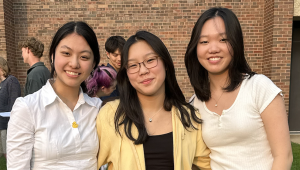Islam: the misunderstood religion
November 10, 2017
With the increasing trend of Islamic terrorism through the world and closer to home in the United States, it has become essential to better understand a religion that over a billion people worldwide practice.
However, with the current political climate in America, no productive conversation on the religion of Islam can be had.
This problem can be seen on both the political left and right, although in different flavours.
Before I continue, I’d like to say that the following statements are not intended to be generalizations of a certain political orientation: making generalizations of groups of people is unproductive and morally reprehensible. People should be judged based on their individual traits and opinions, not based on their political orientation.
Nonetheless, it is undeniable that there are problems dealing with Islam across the political spectrum. In a Trump presidency, the issues of the political right have become clearer when it comes to dealing with Islam.
When you have people like former National Security Advisor, retired Lt. Gen. Michael Flynn calling Islam a “malignant cancer,” there is no room left to differentiate an American Muslim who loves their country from an ISIS soldier who wants to destroy it.
While the right’s problems with Islam are more clear, the left also has major problems that need to be overcome before any productive conversation about Islam can take place.
In a list of “anti-Muslim extremists,” the Southern Poverty Law Center listed Maajid Nawaz, a former member of an Islamist terrorist group and now-leader of Quilliam International, a counter-extremism think tank. Hence, critics of the religion of Islam like Ayaan Hirsi Ali or Sam Harris are labeled Islamophobes. But, as Nawaz states: “It’s not Islamophobic to scrutinise Islam just as it’s not Christianophobic to scrutinise Christianity.”
I’d argue that these criticisms are important in order to further the conversations we need to have on Islam. When terrorist groups behead non-Muslims and burn them alive, take sex slaves, amputate thieves, stone adulterers and other atrocious acts, they do not do so out of a vacuum; these acts can be found within Islamic sources.
The reality that is often not conveyed in current discourse on Islam is the rich scholarship that has developed over a millennium after the death of the Prophet Muhammad. The Muslim world has always dealt with extremists.
While the right sees Islam as a terroristic cult and the left sees Islam as a victim of the “white-supremacist capitalist patriarchy,” the reality is that Islam, like all other religions, is fluid and changes depending on the culture surrounding it.
This is why you see so much diversity in opinion and culture throughout the historical and contemporary Muslim world – the former Muslim world stretched from Spain to India, and Islam has impacted the cultures in all of those areas.
The best weapon against the current ignorance that surrounds Islam is education. Unfortunately, many Americans get their information on Islam from all the wrong sources.
I advise all people of different backgrounds to read the Quran and research the religion of Islam. It is only when people do this that we can have productive conversations regarding issues such as immigration and worldwide terrorism.
When you have terrorist groups using religion as a justification against people who do not know any better, we continue to let them have power.
While you can militarily fight terrorism, ultimately it is the ideology of terrorism that we need to fight.











































